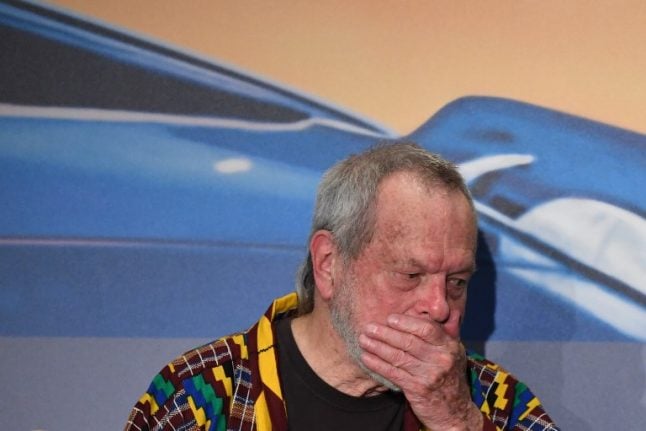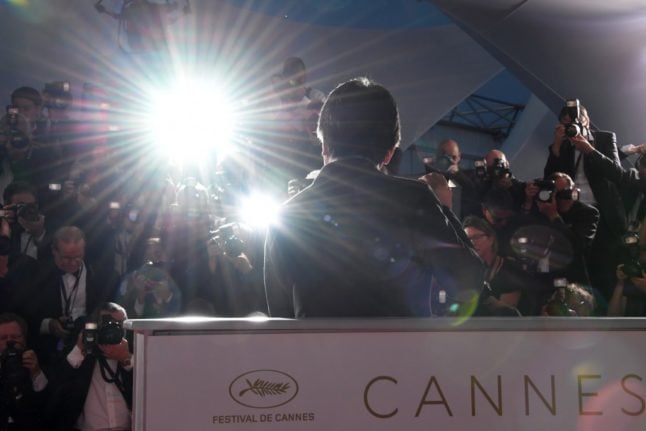Paolo Branco, bien mal conseillé ( par son fils et quelques autres) annonçait notre “déshonneur”.
Ses insultes pathétiques lui reviennent en boomerang. Pas plus Fremaux que moi n’y trouvons de satisfaction. Le seul plaisir qui vaille, ce sera la joie de Gilliam, demain soir.— Pierre Lescure (@pierrelescure) May 18, 2018
CANNES
French court authorises release of ‘cursed’ Gilliam film
A Paris court gave Terry Gilliam the go-ahead Friday to release "The Man Who Killed Don Quixote" in cinemas, a victory for the Monty Python member in the long-running legal battle over the apparently cursed film.
Published: 19 May 2018 15:04 CEST

British-US director Terry Gilliam reacts as he leaves a Saturday press conference for the film "The Man Who Killed Don Quixote" at the 71st edition of the Cannes Film Festival. Photo: Laurent EMMANUEL
The comedy, which is due to close the Cannes film festival on Saturday, was supposed to come out in French cinemas on the same day. But Paul Branco, a former producer of the disaster-hit production, made a last-minute court bid to halt its general release.
Branco, who claims his Alfama Films owns exclusive rights to the movie, has waged a lengthy legal campaign to stop the Hollywood director from releasing the final version starring Jonathan Pryce and “Star Wars” actor Adam Driver.
France's National Centre for Cinema last week issued a screening permit for it to be shown in cinemas, prompting Branco to try to block that decision in the courts.
“It's a big victory, we are very happy and very relieved,” said Christophe Ayela, lawyer for the film's distributors Star Invest Films.
Branco has completely lost the argument, said Cannes festival president Pierre Lescure on Twitter.
“His pathetic insults have come back like a boomerang… the only pleasure to emerge will be Gilliam's joy tomorrow evening,” he said.
Paris judges are due to rule next month on a wider case over who owns the rights, and courts in France and Britain have previously sided with Portuguese-born Branco in the long-running dispute. Branco said he still had the rights to the film after a failed attempt to make it in 2016 when funding fell short.
Gilliam, 77, and his new backers then completed work on the saga at a cost of €16.3 million ($19.4 million) between March and June 2017.
Bulletproof jacket
The legendary polymath and former Monty Python star, whose films include classics like “Time Bandits” and “Brazil”, has struggled for nearly two decades to get the film to the screen.
His various attempts to shoot the surreal story based on Cervantes' “unfilmable” novel have been beset by a series of calamities, some of them recounted in the acclaimed 2002 documentary, “Lost in La Mancha”.
The set was washed away during an aborted attempt to make it in 2000 with Johnny Depp, when lead actor Jean Rochefort also had to be airlifted to hospital after falling ill.
A host of Hollywood stars including Ewan McGregor, John Hurt, Robert Duvall and Jack O'Connell were later linked with the project, but each time the production fell through.
Gilliam had earlier told AFP that Branco had “nothing to do with the (final) film”, and joked Thursday that he would wear a bulletproof jacket to the premiere.
“There is no negotiating with him — his demands are laughable, absurd. He is trying to make as much money as he possibly can from a film he did not produce,” he added.
Branco told reporters earlier this month that he had sunk €800,000 ($948,000) of his own money into the project. “It is thanks to us that this film was made,” he said.
Url copied to clipboard!


 Please whitelist us to continue reading.
Please whitelist us to continue reading.